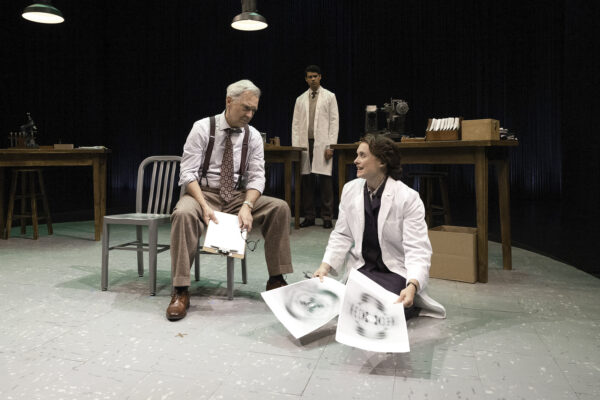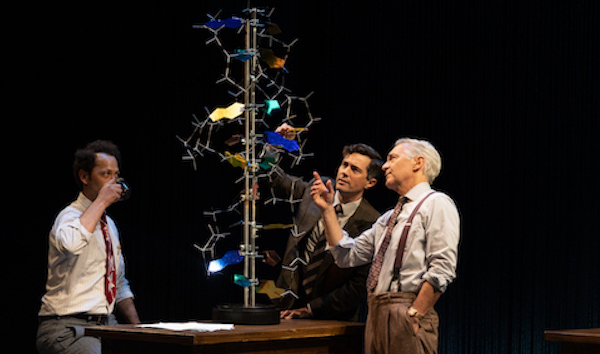Theater Review: “Photograph 51” — Connecting the Dots
By Bill Marx
Anna Ziegler’s play is based on a true story that still resonates powerfully: how science (and society) hides uncomfortable truths.
Photograph 51 by Anna Ziegler. Directed by David Auburn. Staged by the Berkshire Theatre Group at The Unicorn Theatre, The Larry Vaber Stage, 6 East Street, Stockbridge, through July 1.

David Adkins, Brandon Dial, and Rebecca Brooksher in Berkshire Theatre Group’s production of Photograph 51. Photo by Emma K. Rothenberg-Ware.
Is the fact that the Jewish British scientist Rosalind Franklin wasn’t given the credit she deserved in the early ’50s for helping to discover the structure of DNA, the Double Helix, a tragedy? Or is it an opportunity to look at gender bias as well as antisemitism in male-dominated echelons of power? Perhaps her fortunes could be seen as an example of how chance shapes even the most important scientific discoveries: so much depends on being the right person with the right connections at the right time. Or might her story be about how personal limitations can so easily scuttle achievement? If Franklin had only been a different kind of person: collaborative rather than standoffish, more of a theorist and less of a stubborn stickler for detail and certitude. Someone who understood that science can be as much about competition as it is competence. Maybe a diligent researcher who had a bit more imagination? Or could her life be viewed as a sad melodrama that contains bits and pieces of all those other alternatives I mentioned? The latter is the route Anna Ziegler takes in her compelling, but ultimately unsatisfying, docudrama Photograph 51, receiving an earnest production by the Berkshire Theater Festival.
If nothing else, Ziegler’s script focuses on a miscarriage of justice well worth thinking about. From the get-go, Franklin’s (Rebecca Brooksher) exchanges with her condescending fellow researcher, Maurice Wilkins (David Adkins), are icy. Confident in her expertise, Franklin demands that she be able to work out how DNA can be photographed without interference. Her steely defensiveness is no doubt the result of excelling in a male-dominated discipline. Perhaps that opening frostiness explains why, over the course of Photograph 51, Ziegler works to humanize Franklin, a transformation assisted by the arrival of a young American student, Don Caspar (Shaun Anthony), who admires and cares for her. Our sympathies are with this cool customer, but Franklin’s frostiness is formidable. Unfortunately, the dramatist takes few opportunities to probe the character’s perspective on herself or others. Ziegler supplies us with what we need to know, usually through snippets from the scientist’s letters. One scene goes in a blessedly different direction: Franklin’s anguish that she can’t make proper sense of Photograph 51, can’t see how it conclusively pictures the structure of DNA. It is such a moving moment because, for once, we are given a glimpse of Franklin’s internal drama — we hear the pain in her voice, perceive the puzzled scrambling underneath the armor.

Allen Tedder, Christian Coulson, and David Adkins in Berkshire Theatre Group’s production of Photograph 51. Photo: Emma K. Rothenberg-Ware
At least Ziegler’s Franklin is capable of being vulnerable. Few of the males are. The competing team of DNA hunters, James Watson (Allen Tedder) and Francis Crick (Christian Coulson), are drawn as unmitigated opportunists, go-getters out to score a cushy life via a Nobel Prize. They leverage their friendly relationship with Wilkins (and his friction with Franklin) to learn what they need to make their own model of humanity’s DNA. Franklin lags behind because of her empirical sensibility: she is cautious about what lies before her eyes. Is her inability to see life’s elemental pattern tragic? Ziegler provides a potential Greek chorus around her. But these figures never place Franklin’s trials and tribulations in a larger political context, speculate about her psychological state, or bicker about the meaning of it all. They are prosaic mouthpieces whose role is not to provoke thought but to move the story along, often by adding background info or scientific factoids. As for the supporting males, well-meaning lab assistant Ray Gosling (Brandon Dial) is transparent comic relief, and the smitten Don Caspar is a sentimental ideal — this sensitive male was definitely hatched out of a petri dish.
The script’s most complicated guy is Wilkins, who moves from his initial dislike of Franklin to apparently falling in love with her. It is hard to tell if he does, because Ziegler provides scant evidence of Wilkins’s romantic yearnings. He fumes much more than he pines. At one point the scientist is cooperating with Watson and Crick, the next he appears to be jealous of Caspar’s friendship with Franklin — which she returns. In order to clarify the relationship, Ziegler drags in a few spotlit mentions of a 1951 production of The Winter’s Tale directed by Peter Brook and starring John Gielgud as Leontes. The allusions to Shakespeare’s play and its production are frustratingly enigmatic. Does Wilkins undercut Franklin because of false jealousy? An inability to love? Is she a Hermione who returns from the dead — but only when the facts about her seminal contributions are brought to light? Might things have worked out if Wilkins and Franklin had grown closer, becoming teammates rather than adversaries? Who knows?
The Berkshire Theatre Group performances are amiable, with David Adkins infusing avuncular fuss into Wilkins and Rebecca Brooksher embodying the flinty Franklin as an admirable (if self-immobilizing) worshiper of the exact. David Auburn’s direction is engaging, sensitively straightforward. But it is all too carefully handled — there are no attempts to poke or prod the script out of its safe, docudrama groove. And that is a shame, because this play engages with a story that still resonates powerfully: how science (and society) hides uncomfortable truths.
Bill Marx is the editor-in-chief of the Arts Fuse. For four decades, he has written about arts and culture for print, broadcast, and online. He has regularly reviewed theater for National Public Radio Station WBUR and the Boston Globe. He created and edited WBUR Online Arts, a cultural webzine that in 2004 won an Online Journalism Award for Specialty Journalism. In 2007 he created the Arts Fuse, an online magazine dedicated to covering arts and culture in Boston and throughout New England.
